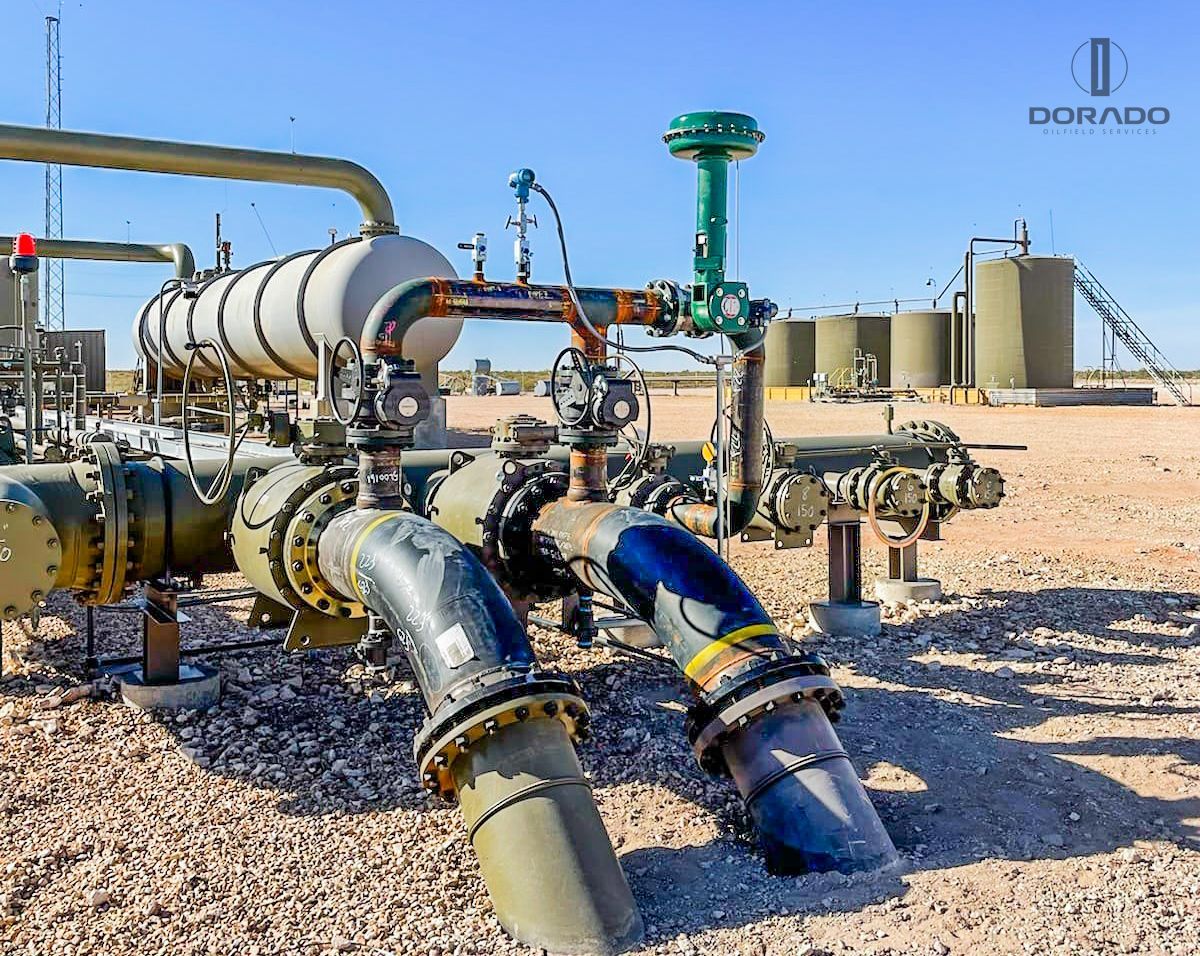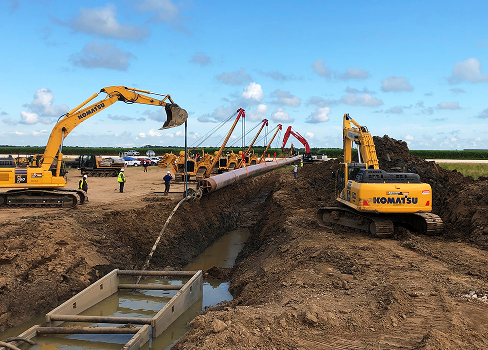Pipeline Construction Services: What Every Project Manager Should Know
Wiki Article
The Important Overview to Recognizing Pipeline Construction Providers and Their Importance
Pipeline Construction services are fundamental to the transportation of essential resources such as gas, oil, and water. These solutions include thorough preparation and implementation, adhering to rigorous safety and environmental requirements. As the sector adapts to contemporary obstacles, understanding its effects and components ends up being significantly vital. What factors add to the growing importance of these services in today's economic situation? The adhering to areas will certainly discover these critical aspects.Overview of Pipeline Construction Solutions
Pipeline Construction services include a series of tasks necessary for the installment and upkeep of pipes made use of to move various materials, consisting of gas, oil, and water. These solutions are important for assuring the efficient and risk-free motion of resources from one area to one more. The process usually starts with thorough preparation and layout, which considers governing needs, ecological factors to consider, and logistical difficulties.Excavation and grading of the land are conducted to prepare the website for Pipeline installation as soon as preparation is full. This is adhered to by the actual laying of the pipelines, which entails welding or joining sections with each other to create a continuous flow path. After installment, extensive screening is done to guarantee honesty and safety. Upkeep services are likewise given to address any kind of problems that may emerge with time. In general, Pipeline Construction services play a crucial function in supporting framework for energy and water circulation.
Secret Elements of Pipeline Construction
A successful Pipeline Construction task depends on several crucial parts that guarantee the safe and efficient installment of the Pipeline system. First, complete website analyses are important, as they recognize the environmental and geographical variables that may impact Construction. Next off, the choice of ideal materials, such as pipes and fittings, is vital for safeguarding durability and compatibility with the delivered compounds.In addition, progressed Construction techniques, including trenchless modern technology and directional exploration, enhance efficiency and reduce environmental impact. Efficient task administration is an additional essential component, working with labor, equipment, and timelines to satisfy job goals.
In addition, interaction among stakeholders, consisting of designers, service providers, and neighborhood authorities, assurances positioning on project requirements and needs. Lastly, extensive quality assurance steps throughout the Construction process ensure compliance with industry requirements and make best use of the Pipeline's functional life expectancy. Collectively, these parts form the foundation of an effective Pipeline Construction task.
Safety And Security Specifications and Regulations in Pipeline Construction

Regulatory bodies, such as the Occupational Safety And Security and Health Administration (OSHA) and the Pipeline and Hazardous Materials Safety Administration (PHMSA), set forth certain requirements that regulate Construction techniques. These consist of protocols for equipment usage, worker training, and emergency feedback treatments. By applying these requirements, Construction business not only safeguard their employees yet additionally safe public trust fund. Ultimately, extensive precaution contribute to the long-lasting success of Pipeline jobs, ensuring they satisfy both operational and environmental expectations.
Ecological Factors To Consider in Pipeline Projects

Ecological factors to consider are important to the preparation and implementation of Pipeline jobs. These tasks have to examine possible influence on ecological communities, water resources, and regional wild animals. Conducting thorough ecological impact evaluations (EIAs) is essential, allowing stakeholders to determine and mitigate dangers prior to Construction starts.
Protecting sensitive areas, such as wetlands and environments, frequently needs implementing particular design features or different routing to reduce disruption. Furthermore, Pipeline drivers are tasked with developing techniques for protecting against leakages and spills, which can have terrible impacts on the atmosphere.
Engagement with regional communities is vital, as public worries can bring about job adjustments that boost environmental management. Conformity with policies established by environmental companies assures that projects fulfill sustainability requirements, cultivating an equilibrium in between infrastructure requirements and ecological preservation. Eventually, attending to ecological factors to consider not only safeguards nature but also promotes community depend on and job practicality.
The Function of Innovation in Pipeline Construction
Innovation plays a crucial function in modern Pipeline Construction, boosting effectiveness and accuracy. Advanced evaluating techniques enable accurate preparation and implementation, decreasing ecological impact and job delays. In addition, the assimilation of automation and robotics enhances procedures, decreasing labor costs and boosting safety and security on Construction sites.Advanced Checking Techniques
Advanced evaluating strategies play a crucial role in the successful implementation of Pipeline Construction jobs. These methods leverage cutting-edge innovation to guarantee exact mapping and analysis of the surface where pipes will be installed. Strategies such as Geographic Info Solution (GIS), LiDAR (Light Discovery and Ranging), and 3D modeling allow designers to envision and evaluate the landscape, determining ecological concerns and possible obstacles. By making use of these advanced devices, groups can enhance accuracy in positioning and placement, considerably decreasing the threat of errors during Construction. In addition, real-time data collection permits immediate changes and notified decision-making throughout the task lifecycle. Eventually, these surveying innovations add to boosted effectiveness, safety and security, and sustainability in Pipeline Construction initiatives.Automation and Robotics

Economic Effect of Pipeline Infrastructure
Pipeline facilities plays see this page a vital duty in facilitating and forming local economic situations profession. By giving a trustworthy means of delivering oil, gas, and various other commodities, pipelines minimize transport costs and improve supply chain effectiveness. This framework attracts investment, promotes work creation, and fosters economic development in bordering areas.The Construction and upkeep of pipelines add substantially to neighborhood economies, producing numerous work possibilities in numerous sectors, from engineering to labor. The influx of jobs frequently results in boosted investing in neighborhood organizations, better strengthening financial task.
Furthermore, pipelines improve energy safety and security by guaranteeing a steady supply of sources, which is essential for household demands and industrial operations. As regions end up being adjoined via Pipeline networks, they get to wider markets, enhancing competition and financial strength. Consequently, the financial effect of Pipeline facilities is multifaceted, affecting both prompt neighborhood economic climates and wider regional growth.
Future Patterns in Pipeline Construction Services
The future of Pipeline Construction solutions is progressing in reaction to technical innovations, governing adjustments, and growing environmental factors to consider. Developments such as robotics and drones are enhancing evaluation and upkeep processes, boosting safety and view it performance. Automation is poised to lower labor expenses and raise precision in Construction procedures. Furthermore, the increasing emphasis on sustainability is motivating business to embrace eco-friendly products and practices, lining up with international efforts to minimize carbon footprints.Governing frameworks are additionally adjusting to deal with ecological influences, pushing for higher transparency and responsibility in Pipeline tasks. The combination of wise modern technologies, including real-time monitoring systems, is expected to enhance the integrity and efficiency of Pipeline networks. As power needs change toward renewable sources, Pipeline Construction services will likely see a surge in jobs connected to biofuels and hydrogen transportation. Overall, these trends indicate a transformative period for the Pipeline Construction industry, concentrated on advancement and sustainability.
Regularly Asked Inquiries
What Types of Pipelines Are Frequently Built?
Numerous kinds of pipes are frequently built, consisting of oil, sewage, gas, and water pipelines - Pipeline Construction Services. Each offers unique functions, facilitating the transportation of vital resources across regions while adhering to safety and security and ecological lawsThe length of time Does a Normal Pipeline Task Take?
The period of a common Pipeline job varies considerably, usually ranging from numerous months to a couple of years. Aspects influencing this timeline include task complexity, regulatory authorizations, and ecological considerations that should be addressed.That Controls Pipeline Construction Business?
Pipeline Construction companies are managed by numerous federal, state, and local firms, including the Pipeline and Hazardous Materials Safety And Security Management (PHMSA) and state public utility commissions, making certain compliance with safety and environmental standards throughout the Construction procedure.What Are Typical Materials Made Use Of in Pipeline Construction?
Typical materials used in Pipeline Construction consist of steel, polyethylene, and PVC. Each product provides distinctive advantages such as resistance, longevity, and versatility to deterioration, making them appropriate for different applications in transferring liquids and gases.
Just How Are Pipeline Construction Prices Approximated?
Pipeline Construction expenses are estimated by evaluating factors such as product costs, labor rates, project intricacy, environmental considerations, and governing needs (Pipeline Construction Services). Precise expense estimation guarantees efficient budgeting and project preparation throughout the Construction processPipeline Construction services incorporate a variety of activities necessary for the setup and maintenance of pipelines made use of to move different substances, consisting of gas, oil, and water. A successful Pipeline Construction task relies on numerous crucial components that assure the efficient and safe setup of the Pipeline system. Advanced surveying methods play an important duty in the successful implementation of Pipeline Construction projects. Numerous types of pipelines are generally built, consisting of oil, gas, water, and sewage pipes. Pipeline Construction costs are approximated by analyzing aspects such as material costs, labor rates, task complexity, ecological factors to consider, and regulatory demands.
Report this wiki page